Ethiopia / Chelelektu
We love a natural Ethiopian and we’re so excited to bring this absolute beauty to you. It's our first time working with the Chelelektu washing station and we are IMPRESSED.
We use Royal Mail’s 48hr service, so typically in 2-3 working days. We also have an upgraded DPD next working day option at checkout. All orders placed before 2PM are sent on the same day.
We accept returns of any equipment or faulty goods within 14days of purchase. We will refund postage for faulty goods.
Coffee is a consumable good and we can therefore only replace or refund faulty or damaged coffee, which is subject to assessment by our Quality Control team. Please contact info@newgroundcoffee.com and we’d love to help resolve any issues.
All our packaging is recyclable. We use carbon neutral delivery in Oxford, and always looking for new ways to reduce our impact on the planet. Oh, by the way we’re a B-Corp – read more here.
This is a grade 1, dry processed lot from Chelelektu wetmill in Kochere disctrict, Gedeo zone.
The mill, managed by Legese Kebede, processes cherries from around 650 local smallholder farmers. Farmers typically cultivate less than 2 hectares of land and farms range between 1,900 and 2,100masl, some of the highest altitude coffee terroir in the world.
Shade grown, ripe cherries are delivered to the mill for careful sorting, to select only the ripest.
The cherries are dried in the sun on raised African beds for approximately 12 – 15 days. In the daytime they are raked and turned periodically to ensure a consistent drying process; covered between 12pm and 3pm to protect them from sun damage and at night time to protect it from rainall and moisture. Once the coffee has dried to the right level it is milled, graded, sorted and thoroughly handpicked, before being bagged in GrainPro for export from the port of Djibouti.
Coffee is ancient in Ethiopia, but coffee farming is not. By the end of the 9th Century coffee was actively being cultivated in Ethiopia as food, but probably not as a beverage. It was the Arab world that developed brewing. Even as coffee became an export for Ethiopia in the late 1800’s, Ethiopian coffee was the result of gathering rather than agricultural practices. A hundred years ago, plantations, mostly in Harar, were still the exception, while “Kaffa” coffee from the southwest was still harvested wild. In 1935, William Ukers wrote: “Wild coffee is also known as Kaffa coffee, from one of the districts where it grows most abundantly in a state of nature. The trees grow in such profusion that the possible supply, at a minimum of labor in gathering, is practically unlimited. It is said that in south-western Abyssinia there are immense forests of it that have never been encroached upon except at the outskirts.”




